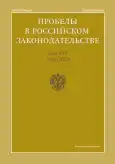Legal Sight on the Presence of Nuclear Elements in Outer Space
- Autores: Panova A.S.1
-
Afiliações:
- Russian Foreign Trade Academy of the Ministry of economic development of the Russian Federation
- Edição: Volume 16, Nº 8 (2023)
- Páginas: 222-227
- Seção: International Legal Sciences
- URL: https://bakhtiniada.ru/2072-3164/article/view/251422
- EDN: https://elibrary.ru/PPSVUX
- ID: 251422
Citar
Resumo
This article explores the legal regulation of the use of nuclear energy in outer space, in particular, the issue of the use of nuclear energy sources in space objects is considered. The purpose of this research is to analyze the existing norms of international law governing the possibility of using nuclear energy in space, as well as to identify gaps in such regulation. In addition, the study is aimed at more detailed research of the existing norms of “soft law”, in particular, the Principles Relevant to the Use of Nuclear Power Sources in Outer Space 1992 are considered. It is practically the only regulator of the use of nuclear power sources in outer space. The article provides an analysis of the fundamental conventions in the field of regulation of nuclear energy in the context of its application relatively to space, which is based on the opinion of competent scientists of international nuclear law and international space law.
The author of this article conducts a detailed analysis of the regulatory framework in the field of using the energy of the atomic nucleus in space, namely, by using the comparative legal method, the fundamental norms, ideas and advantages, as well as drawbacks of such legal acts as: Treaty on Principles Governing the Activities of States in the Exploration and Use of Outer Space, Including the Moon and other Celestial Bodies 1967, Convention on Early Notification of a Nuclear Accident 1986, Convention on Assistance in the Case of a Nuclear Accident or Radiological Emergency 1986, Principles Relevant to the Use of Nuclear Power Sources in Outer Space 1992 are revealed.
The author comes to the conclusion that the existing legal regulation of the use of nuclear energy sources in space is not complete, comprehensive and sufficient, but notes that steps towards better regulation are being made, which is already a good trend and indicates a huge amount of work done.
This article reflects analysis of the current provisions of international treaties, as well as “soft law” documents in order to more fully identify the essence of the issues under study. This article will be useful to students of law schools, graduate students, teachers of public international law, international energy law, international nuclear law, international space law as well as all those interested in the issue of usage of nuclear energy for the outer space missions and the resolution of the problem of legal regulation of this complicated issue.
Texto integral
##article.viewOnOriginalSite##Sobre autores
Aleksandra Panova
Russian Foreign Trade Academy of the Ministry of economic development of the Russian Federation
Autor responsável pela correspondência
Email: ale31.50@mail.ru
2nd year student of the master's degree "Legal regulation of export and import"
Rússia, MoscowBibliografia
- A. Dasgupta The use of nuclear power sources in outer space.
- Alexander F. Cohen, Cosmos 954 and the International Law of Satellite Accidents, 10 Yale J. Int’l L. 79, 1984.
- Gary L. Bennett, Joseph A. Sholtis, Jr. and Bruce C. Rashkow, United Nations Deliberations on the Use of Nuclear Power Sources in Space: 1978-1987 in Space Nuclear Power Systems 49 (M.S. El-Genk and M.D. Hoover ed.), 1988.
- Preliminary analysis of the positive impact of the Principles Relevant to the Use of Nuclear Power Sources in Outer Space on the safety of space nuclear power source complexes at https://www.unoosa.org/res/oosadoc/data/documents/2020/aac_105c_1l/aac_105c_1l_378_0_html/V1911437.pdf.
- Framework for ensuring the safe use of nuclear power sources in outer space at https://www.unoosa.org/pdf/reports/ac105/AC105_934R.pdf.
Arquivos suplementares








